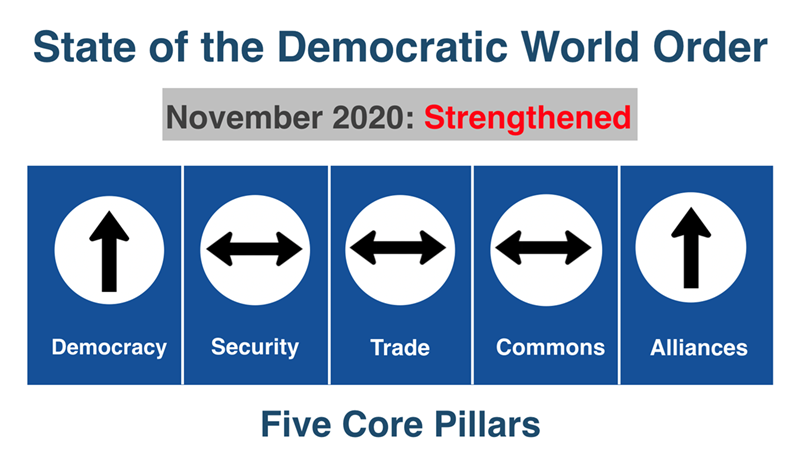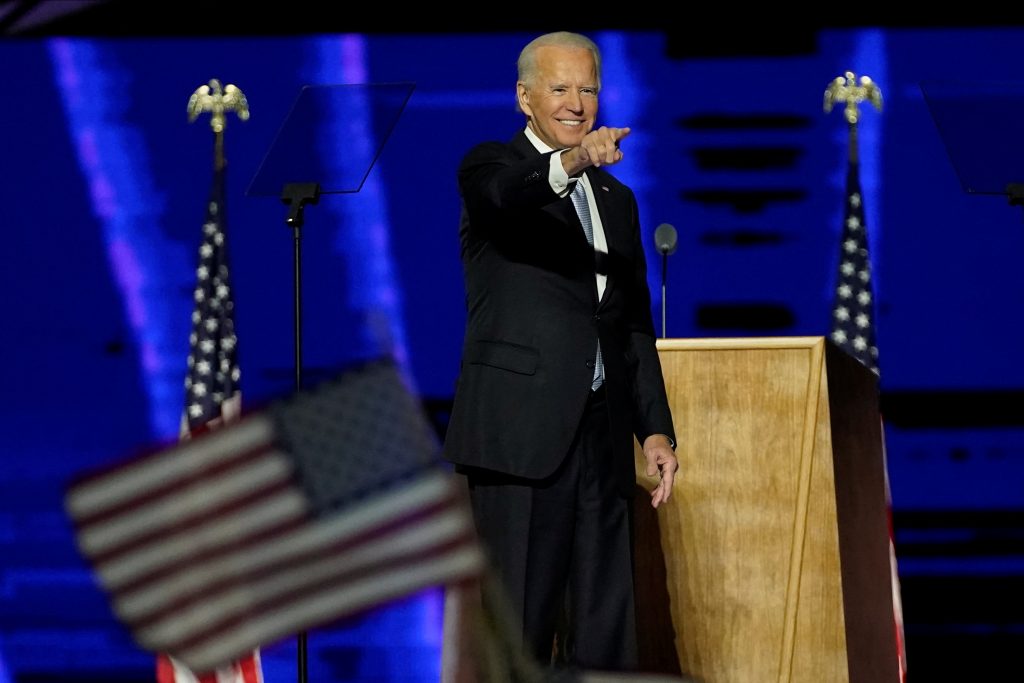Reshaping the order
This month’s topline events
Biden’s Historic Win. With voter turnout at its highest level in more than a century, Joe Biden was elected the 46th president of the United States, marking an end to the tumultuous presidency of Donald Trump. As Kamala Harris prepares to become the first female, African-American, and Asian-American Vice President, Biden named his national security team and signaled his desire to prioritize democratic cooperation and multilateral engagement, including reentering the Paris Climate Accords.
- Shaping the Order. Joe Biden’s’ victory presages a turning point for America’s role in the global order. After four years of “America First,” Biden’s intent to return to a more multilateralist foreign policy will be welcomed, especially by America’s closest allies. The incoming administration will face a series of profound challenges that will require sustained cooperation in an increasingly fractious global environment.
- Hitting Home. While Biden campaigned on protecting American workers, his expected shift away from Trump’s protectionist policies could lead to new trade agreements, including a revised Trans-Pacific Partnership — potentially opening markets that will benefit US companies and consumers.
- What to Do. President-Elect Joe Biden has a historic window of opportunity to reshape a global order in great need of revitalization and adaptation. The incoming administration should concentrate on constructing new partnerships with democratic allies, including a D10, to galvanize collective action on the pandemic, China, climate change, trade, technology, and other pressing challenges.
US Democracy under Strain. Despite the clear election outcome, President Trump refused to concede defeat, instead launching an unprecedented attack on the integrity of the vote and seeking to reverse the results through legal challenges and pressure on state legislators and local officials. While these efforts fell short, they persuaded large numbers of Republican voters to believe that the election was stolen.
- Shaping the Order. While America’s governing institutions have so far proven resilient, Trump’s bid to overturn the results of the election could damage American democracy, with large numbers of voters losing faith in the electoral process. These actions risk playing into Russian efforts to sow political discord in the United States.
- Hitting Home. Trump’s continued insistence that the election was fraudulent could to increase political polarization and even potential violence.
- What to Do. Republican leaders, particularly members of Congress and state governors across the country, should make clear that they see no merit in claims of widespread voter fraud and that the results demonstrate a clear and legitimate victory for Joe Biden.
Vaccine Breakthrough. With COVID infection rates soaring across the US and Europe, two US pharmaceutical companies announced they had separately developed highly-effective coronavirus vaccines. With direct bilateral purchase agreements in place with these companies, Australia, Canada, Japan, the United States, and the countries of the European Union have pre-ordered half the world’s expected available vaccine supply and could see large swathes of their populations immunized by mid-summer 2021.
- Shaping the Order. The delivery of the vaccines could help fuel an economic recovery in advanced economies, leading to the resumption of regular travel and commerce by mid-2021. But with vaccine distribution lagging, the virus will remain rampant across large parts of the developing world well into 2022. China, which will reportedly have its own vaccine ready soon, and Russia, which claimed its Sputnik V vaccine is highly effective, are poised to deliver vaccines to countries where they seek to gain influence, including Brazil, Mexico, Indonesia, and Turkey — potentially at the expense of the United States and its allies and partners.
- Hitting Home. As large numbers of vaccine doses are produced and distributed across the country, Americans will gradually be able to resume more in-person activities safely, though the return to life resembling pre-pandemic normalcy will be many months down the road.
- What to Do. As the Biden administration prepares to govern, it should throw its support behind COVAX, the global vaccine distribution coalition, and work with allies to help ensure timely delivery of high-quality vaccines to developing countries across the globe.
“America is and remains our most important ally, but it expects of us – and rightly – greater efforts of our own to care for our security and to stand up for our convictions in the world… I look forward to working with President Biden. Our trans-Atlantic friendship is indispensable if we are to deal with the major challenges of our time.”
– German Chancellor Angela Merkel

State of the Order this month: Strengthened
Assessing the five core pillars of the democratic world order
- Democracy (↑) – Joe Biden’s victory in the presidential election signaled a momentous reaffirmation of democratic norms in the United States, despite Trump’s refusal to concede. In other developments, Belarusian President Lukashenka’s announcement that he would step down after a new constitution is in place raised hopes for democratic change, though opposition leaders reacted skeptically. China disqualified four pro-democracy lawmakers in Hong Kong, leading to a mass resignation of nearly all of the opposition — a protest move that will further consolidate parliamentary control, at least for now, of the pro-Beijing camp. Overall, the democracy pillar was strengthened.
- Security (↔) – After firing his defense secretary, Trump announced additional withdrawals of US troops from Afghanistan and Iraq. China issued an extraordinary verbal assault against Australia, demanding that Canberra stop its media from criticizing the Chinese Communist Party, while Australia assertively pushed back. Iran’s nuclear program suffered a significant setback with the assassination of its chief nuclear scientist Mohsen Fakhrizadeh – an attack that Tehran blamed on Israel and vowed to retaliate. On a more positive note, Armenia and Azerbaijan agreed to a truce in their weeks-long armed conflict in Nagorno-Karabakh, while India and China began talks to end their dispute in the border region of Ladakh. Overall, the security pillar was unchanged.
- Trade (↔) – China joined Japan, Australia, South Korea, and eleven other Asian nations in signing the Regional Comprehensive Economic Partnership, billed as the world’s largest trading bloc as it encompasses nearly a third of all global economic activity. On a positive note, the agreement will serve to reduce trade barriers; however, it will also help to expand China’s regional economic influence. The UK and the EU continued Brexit trade talks, as a late December deadline for a final agreement looms. EU regulators filed antitrust charges against Amazon, claiming the company engaged in anti-competitive practices. Overall, the global trade pillar was unchanged.
- Commons (↔) – Amid the breakthrough announcements on vaccines, Europe and the US recorded more coronavirus deaths this month than at any point during the pandemic, resulting in new lockdowns and restrictions aimed at minimizing infection rates. Deforestation in Brazil’s Amazon Rainforest reached a twelve-year high. Overall, the global commons pillar was unchanged.
- Alliances (↑) – Biden’s victory was a sigh of relief for US allies concerned about America’s commitment to NATO and other alliances. Australia and Japan agreed to boost their military ties amid rising concerns over China. On the downside, Turkey lodged a protest with the UN after Germany searched a Turkish-flagged ship suspected of carrying illegal weapons to Libya in violation of a UN arms embargo. The European Union faced a budget impasse (later resolved) after Poland and Hungary objected to rule-of-law protections. Overall, alliances were strengthened.
Strengthened (↑)________Unchanged (↔)________Weakened (↓)
What is the democratic world order? Also known as the liberal order, the rules-based order, or simply the free world, the democratic world order encompasses the rules, norms, alliances, and institutions created and supported by leading democracies over the past seven decades to foster security, democracy, prosperity, and a healthy planet.
This month’s top reads
Three must-read commentaries on the democratic order
- Samantha Power, writing in Foreign Affairs, suggests that restoring American leadership must include the more basic task of showing that the United States is a capable problem solver once more.
- Julien Barnes-Dacey and others from the European Council on Foreign Relations call for a new transatlantic relationship with Biden, one in which the EU, UK, and US would work together through the D-10 to carry out an agenda of democratic renewal at home and abroad.
- Sophia Richardson writes in Foreign Affairs that the Biden administration should be prepared to take stronger actions to stand up to China on human rights.
Action and analysis by the Atlantic Council
Our experts weigh in on this month’s events
- The Scowcroft Center released a new Allied Strategy for China, co-authored by Jeffrey Cimmino and Matthew Kroenig, with contributions from ten D-10 experts, that sets forth a comprehensive, three-part strategy for likeminded allies to address China’s challenge to the rules-based system.
- Ash Jain and Alex Pascal, writing in the National Interest, call for the Biden administration to make true partnership with democratic allies the central organizing principle of US foreign policy.
- Damon Wilson writes in the New Atlanticist that Biden will need to cultivate a bipartisan consensus home, while forging a new model of US leadership in a world that has become more reluctant to follow America’s lead.
- Matthew Kroenig, in Foreign Policy, writes that US-China competition is not just about great-power rivalry, it is also about an ideological battle between democracy and authoritarianism.
- In a new Atlantic Council report, Dan Fried and Alexander Vershbow analyze what went wrong in the US-Russia relationship after the end of the Cold War and make the case against a new grand bargain with Russia.
- Erica Borghard, writing for the New Atlanticist, suggests that the pandemic has revealed an inextricable link between foreign policy and domestic politics — something that Biden clearly recognizes.
- Frank Kramer, in an Atlantic Council issue brief, lays out six spheres of strategic cooperation between Europe and North America to guide joint foreign policy goals with respect to China.
__________________________________________________
The Democratic Order Initiative is an Atlantic Council initiative aimed at reenergizing American global leadership and strengthening cooperation among the world’s democracies in support of a rules-based democratic order. Sign on to the Council’s Declaration of Principles for Freedom, Prosperity, and Peace by clicking here.
Ash Jain – Senior Fellow
Dan Fried – Distinguished Fellow
Jeffrey Cimmino – Program Assistant
Gabriel Angelini – Intern
Paul Cormarie – Georgetown Student Researcher
If you would like to be added to our email list for future publications and events, or to learn more about the Democratic Order Initiative, please email AJain@atlanticcouncil.org.
Image: Democratic 2020 U.S. presidential nominee Joe Biden acknowledges the crowd at his election rally, after the news media announced that Biden has won the 2020 U.S. presidential election, in Wilmington, Delaware, U.S., November 7, 2020. Andrew Harnik/Pool via REUTERS
